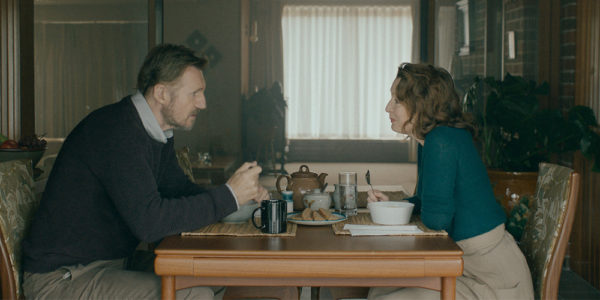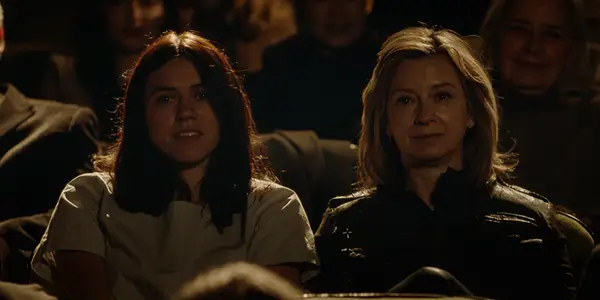TIFF 2019: Foreign Coming-of-Age & Romance Films: ORDINARY LOVE, EASY LAND, AUGUST, DIRT MUSIC

David is a film aficionado from Colchester, Connecticut. He enjoys…
It’s tempting to spend much of TIFF viewing primarily the bigger release films. After all, who doesn’t want the bragging rights at having seen films like Joker or Knives Out before anyone else?
At least once or twice a day, though, I tried to branch out into the lesser-known corner of the festival, to potentially discover some hidden gems. Some of these films that I eventually found contained some recognizable names, such as Ordinary Love and Dirt Music, yet they were still those that I might not have seen otherwise. They also, almost coincidentally, happened to fit into one of two recognizable categories: that of coming-of-age or romance. I’m very glad I sought them out.
Ordinary Love (Lisa Barros D’Sa and Glenn Leyburn)

I saw Ordinary Love bright and early on my fourth day of TIFF. Originally enticed by the names of Liam Neeson and Lesley Manville, I also wanted something slower and potentially more melancholy than a lot of the other releases I had seen thus far. And Ordinary Love turned out to be exactly that.
Tom (Neeson) and Joan (Manville) are an older couple living, you guessed it, a rather ordinary life. Their daily routine consists of long walks, meals spent together, warm conversation, and everything else that goes along with a life spent with someone. One day, though, Joan unnervingly discovers a lump on her breast. Concerned, she visits the doctor, and after some tests, they discover that it is what they had feared: breast cancer. Much of the remainder of the film consists of the lengthy and arduous process of chemotherapy and recovery.
Directors Lisa Barros D’Sa and Glenn Leyburn approach Ordinary Love through an everyday lens. Tom and Joan are a couple that most people could see themselves in, and the diagnosis of breast cancer for Joan is the type of situation that could happen to anyone. The way it affects Tom and Joan’s relationship, then, is about as realistic as you can imagine. Joan feels that Tom is insensitive, since it is she who is going through the process of treatment, yet Tom feels resentful of that, since, in a way, he has to go through it as well. Yet it’s clear, through it all, that they share a strong love for one another.
The film likely wouldn’t work as well as it does without the dual performances of Neeson and Manville. Manville embodies Joan with the struggles of undergoing the long road to recovery from breast cancer, while attempting to keep a high spirit through it all. While Neeson is about as sensitive and charming as he’s been in years as Tom, a far cry from his action persona that he has become synonymous with. Ordinary Love also employs a steady repeating musical theme for the two, which gets fittingly darker as the film’s subject does as well.
Ordinary Love had a greater impact on me because this very situation happened to my parents only a few years ago. My mom was diagnosed with breast cancer out of nowhere back in 2015, and I saw and experienced the toll it took on her and on my family as a whole. I personally experienced what Tom and Joan went through, and to see it displayed so accurately on screen was something I am sincerely thankful for.
Easy Land (Sanja Zivkovic)

Easy Land is one of many films of recent years to shine light on refugees and on immigration as a whole. Here, the characters are Nina (Nina Kiri) and her mother Jasna (Mirjana Jokovic), two Serbian refugees who have recently settled in Canada. The two struggle to stay afloat, however, as Jasna cannot find a suitable job as an architect, while Nina must deal with not only these difficulties, but also the normal struggles that come with being a teenager.
The film as a whole feels like a very personal endeavor; indeed, writer-director Sanja Zivkovic is herself a Serbian who moved to Canada. Using this a stepping point, she creates a canvas from which her characters try to learn and adapt to their world, though clearly struggling along the way. Jasna, on one hand, suffers from delusions brought forth through a recent mental breakdown, yet she feels she can make up for that with a project called Easy Land, a housing building for recent immigrants. While Nina, due to recent misbehavior, has been assigned to shadow a drama show, in the hopes that she will shape up and learn something through the process.
Easy Land, operating on a lower budget, makes the best of its limited resources. The story is simple, yet powerfully effective all the same. Much of its success is also owed to the performances by Jokovic and Kiri. Kiri, who people may know as the recurring character of Alma on The Handmaid’s Tale, captivates here, bringing forth an enthusiasm that will hopefully lead to larger dramatic roles in the future.
Easy Land is desolate at moments, yet also ultimately hopeful for immigrants as a whole. With the struggles that refugees in particular have had, it helps to portray them in a sensitive light, potentially opening up the eyes of people who wouldn’t otherwise bother to gaze in their direction.
August (Armando Capó)

Cuba: it’s a place in the world one doesn’t think of much when it comes to film. Yet August not only focuses on the isolated Caribbean country, it also is set during an integral time: in 1994, during the balseros crisis, when large numbers of Cubans risked everything in order to sail across the ocean to America.
August focuses on a young boy named Carlos. He spends the blistering days of summer as most kids would: spending time with his friends, becoming interested in girls, and, at home, taking care of his aging grandma. Yet, when the economic crisis starts to rear its face more and more, Carlos is forced to grow up faster than he might’ve intended to.
Much like Easy Land, August is also semi-autobiographical, here by director Armando Capó, who grew up in Cuba during the balseros crisis. It’s even shot in his hometown, using a large number of non-professional actors, which adds more to its authenticity. Capó beautifully captures the surrounding landscape of the island, in a manner that shows his attachment to it. There may not be a lot that occurs during the course of August, but sometimes it’s in the silent moments that he manages to captivate.
For any of us that remember, it’s a struggle to deal with the angst of growing up, but it’s even more so when poverty is so rampant, as it was in Cuba at the time. While gazing back at the crisis in Cuba, it’s not too hard to make comparisons to our present immigration crisis at the border. It’s often by looking back at the struggles of the past that we are able to more sufficiently understand the present as well.
Dirt Music (Gregor Jordan)

For my final review of foreign films at TIFF, we travel all the way to Australia, where Gregor Jordan has brought Tim Winton‘s novel to life. Taking place in the harsh outback of Western Australia, the film focuses on two individuals: they are the rebellious Georgie (Kelly Macdonald), who lives a lonely life married to a man she doesn’t love, and Luther Fox (Garrett Hedlund), an outsider with a mysterious past. When the two meet, they start an unexpected romance, that is, until Luther’s past seems to finally have caught up to him.
Dirt Music is amongst the more unusual love stories I’ve seen in some time. That is because, first and foremost, it’s not really about their love at all. It’s more a story of learning to move on, to forgive your past, and to embrace the chances of a future despite all that came before. Perhaps most strangely, we don’t even see the two lovers together for much of the film. Instead, we get the increasingly more erratic efforts of Luther branching further and further out into the harsh Australian climate, while Georgie desperately tries to find him before it’s too late. But each of their actions speak volumes.
More than anything, Dirt Music uses its setting as a reflection of the inner turmoil of its characters. While Luther tries to use it to escape, Georgie instead embraces it, attempting to traverse farther into it in order to save Luther from himself. It’s one of the more idyllic uses of a landscape in recent cinema.
Kelly Macdonald and Garrett Hedlund are also sublime in Dirt Music. Macdonald warmly portrays the arc of Georgie, who turns from loner to selfless savior over the course of the film, while Hedlund, doing his best Liam Hemsworth impression, is excellent as the silent, wounded Luther. It’s perhaps his finest performance to date.
Conclusion
Well, that about concludes my rundown of the foreign films I was able to catch at TIFF. Stay tuned for more reviews!
What are your thoughts on any of the films mentioned? Let us know in the comments below!
Does content like this matter to you?
Become a Member and support film journalism. Unlock access to all of Film Inquiry`s great articles. Join a community of like-minded readers who are passionate about cinema - get access to our private members Network, give back to independent filmmakers, and more.
David is a film aficionado from Colchester, Connecticut. He enjoys writing, reading, analyzing, and of course, watching movies. His favorite genres are westerns, crime dramas, horror, and sci-fis. He also enjoys binge-watching TV shows on Netflix.












